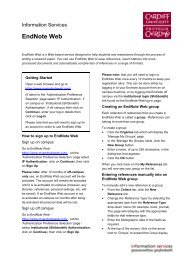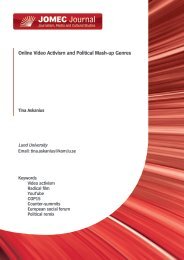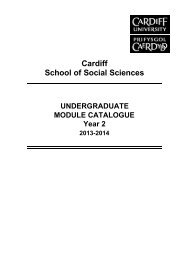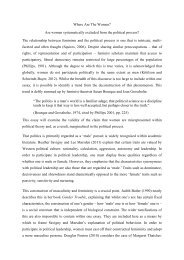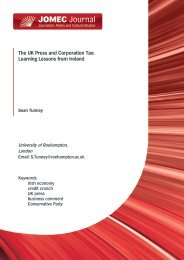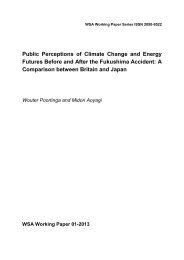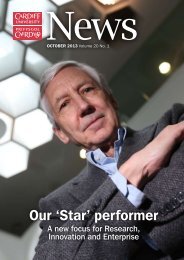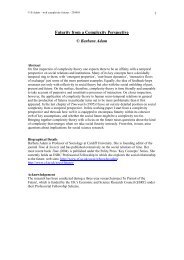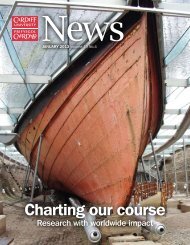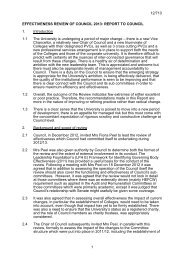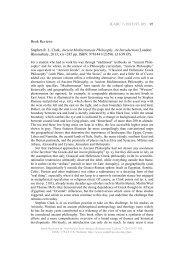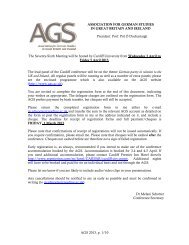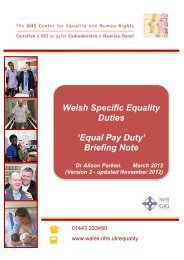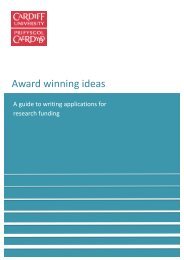APHRODITE IN PROCLUS' THEOLOGY - Cardiff University
APHRODITE IN PROCLUS' THEOLOGY - Cardiff University
APHRODITE IN PROCLUS' THEOLOGY - Cardiff University
You also want an ePaper? Increase the reach of your titles
YUMPU automatically turns print PDFs into web optimized ePapers that Google loves.
JLARC 3 (2009) 21-43 31<br />
differs from the Platonic, which sees all elements as present in each planetary sphere<br />
in the same way as the sublunar elements participate in each other.<br />
When it comes to dedicating seasons to divinities, Proclus accepts this theory. 41<br />
Cronus and Ares, winter and summer, form an opposite pair, while Zeus and<br />
Aphrodite, spring and autumn, form another. The connection between Aphrodite<br />
and autumn is easy to understand: “... autumn belongs to Aphrodite,” Proclus says,<br />
“because during this season seed is thrown to earth and the task of Aphrodite is to<br />
mix fertile germs and lead them to communion with the cause of becoming.”<br />
Proclus sees Aphrodite as a demiurgic power that brings into harmony and<br />
unification the masculine and feminine, ideal forms and matter in cosmos. 42 This<br />
is why he also interprets the office for the supervising public marriages in Plato’s<br />
treatment of the ideal state as being analogous to Aphrodite.<br />
A final Aphrodisiac item of the cosmos belongs to the area of astrology. Each<br />
star has special mutual positions which are dangerous to the development of the<br />
embryo. If Aphrodite has been in this adverse position during the conception, this<br />
destroys the seed at the 120th day of pregnancy. Proclus does not say if he held<br />
this opinion, he states it as a rule of the Egyptians. 43<br />
Aphrodite as a hypercosmic-encosmic deity<br />
On the next level up, the hypercosmic-encosmic order, Proclus posits a divine dodecad<br />
which corresponds to the twelve gods of the Phaedrus.<br />
Theol. Plat. 6.85,6-12: Τοὺς τοίνυν ἀπολύτους πάντας θεοὺς ἀπερίληπτον ἔχοντας<br />
πλῆθος καὶ ταῖς ἀνθρωπίναις ἐπιβολαῖς ἀναρίθμητον, ἐνταῦθα κατὰ τὸ τῆς δωδεκάδος<br />
μέτρον ἀφορίζει. Καίτοι γε οὔτε τῶν θεολόγων ὅσοι τι περὶ αὐτῶν γεγράφασιν<br />
ὁρίσαι δεδύνηνται τὸν ὅλον αὐτῶν ἀριθμόν, ὥσπερ τὸ ἀρχικὸν πλῆθος<br />
ἢ τὸ τῶν νοερῶν θεῶν ἢ τὸ τῶν νοητῶν·<br />
The plurality of these deities is incomprehensible and impossible to enumerate for<br />
human intuition but inspired Plato defines them in Phaedrus’ vision with the model<br />
of a dodecad. None of the theologians, who have written something about them,<br />
has been able to define the perfect number of these divinities, as opposed to that<br />
plurality which relate to the primordial principles, noeric gods, and noetic gods<br />
(translation mine).<br />
With these previous gods Proclus probably means the first henads derived from<br />
the One — the limit and the infinite — and the noetic and noetic-noeric triads<br />
41 In Remp. 2.62,6-18.<br />
42 In Tim. 1.34,15-17.<br />
43 In Remp. 2.58, 20. See Festugière’s note in Proclus. Commentaire sur la République 2 (Paris,<br />
1970), p. 167 n. 1.<br />
Tuomo Lankila, ‘Aphrodite in Proclus’ Theology,’ in: Journal for Late Antique Religion and<br />
Culture 3 (2009) 21-43; ISSN: 1754-517X; Website: http://www.cardiff.ac.uk/clarc/jlarc



